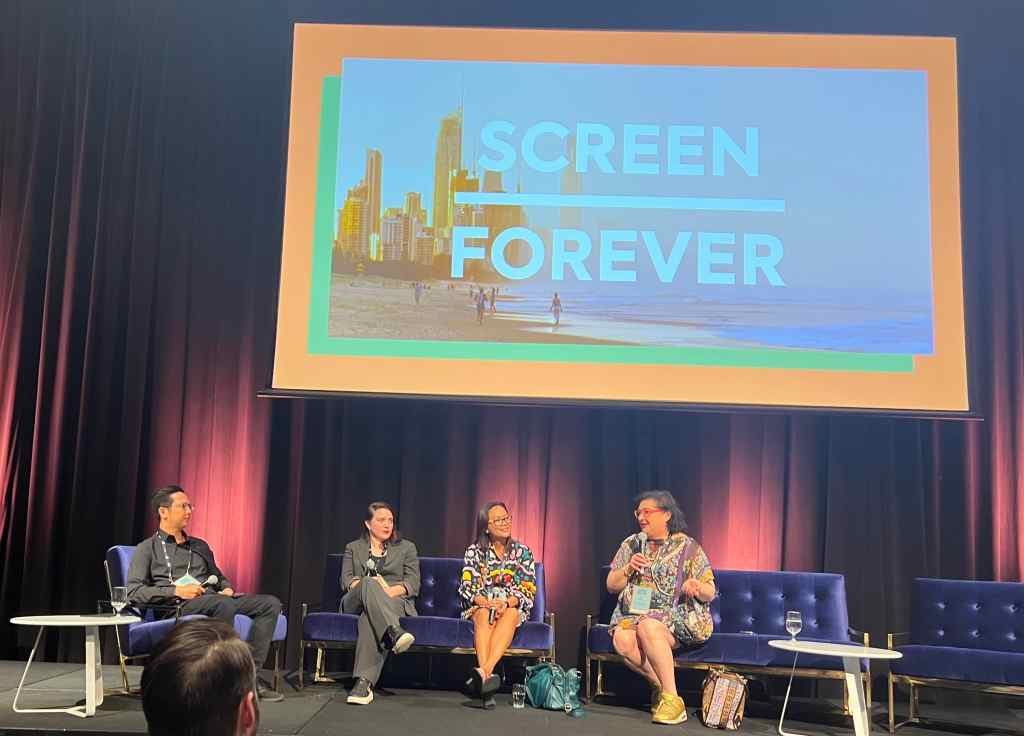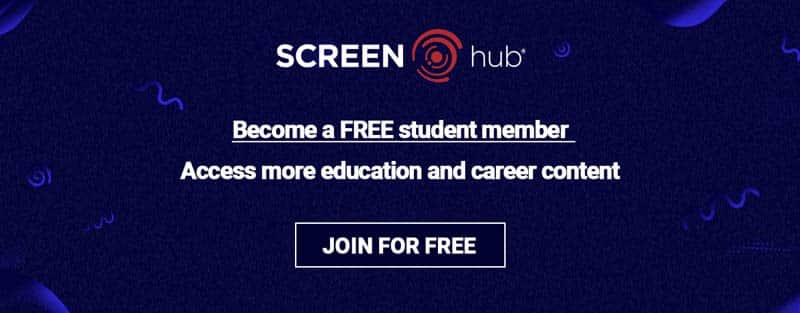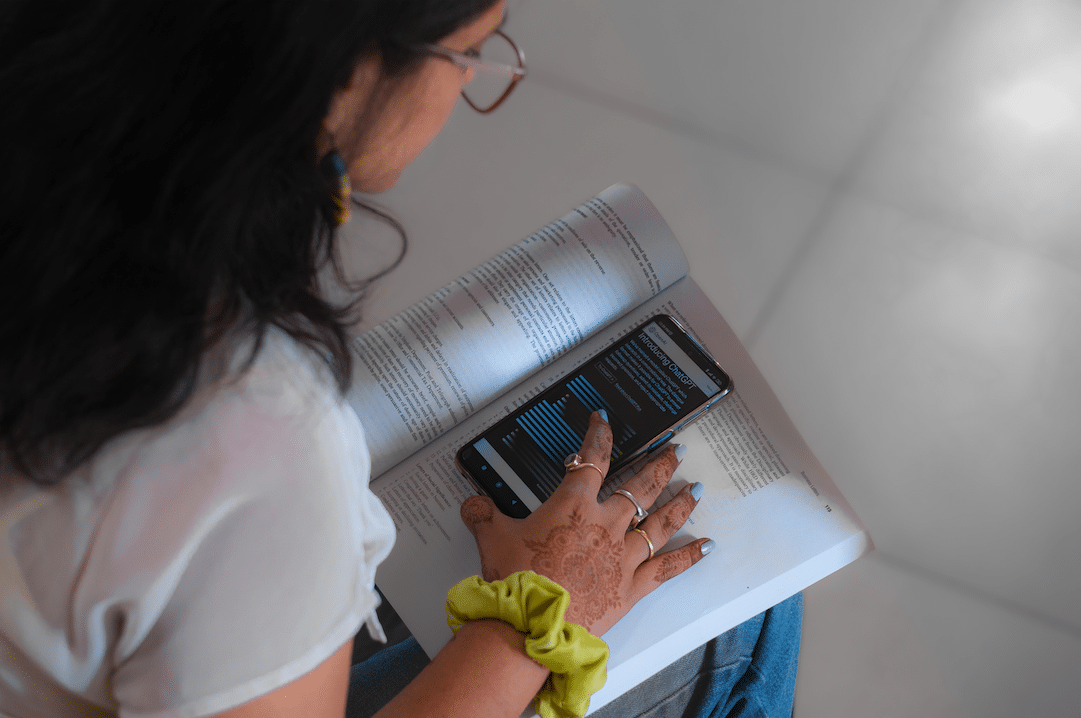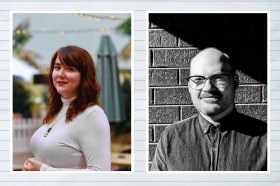Screen Forever 2023 (3–10 May) featured a panel of technologists considering the potential and challenges of Artificial Intelligence (AI) in screenwriting and storytelling. They delved into the latest developments, how AI is transforming the creative process, and the ethical considerations for use of AI in the entertainment industry.
The panel: ‘This session title was generated by ChatGPT’, was chaired by Reggie Ba-Pe III, Co-founder of Club Media. Guests were Grace Chung, Head of Google Research Australia; Kate Armstrong-Smith, Co-founder, CEO & EP for Othelia Story Technologies; and Rita Arrigo, Strategic Engagement Manager, CSIRO National AI Centre.
The Creative Process
The session started with the use, value, and potential of AI as part of the creative process. Tools like ChatGPT are gaining popularity because of their capacity for conceptualising and developing stories. According to Othelia’s Kate Armstrong-Smith, AI and intelligent software have impacted screenwriting, particularly as technologies become more intelligent. But the community and the industry are increasingly anxious that our stories will become more artificial.
Read: Screen Forever 2023: need to know
Othelia Story Technologies, an industry startup funded by the federal government, is researching and building intelligent story software to find new ways to develop creative technology that enables creativity. Othelia aims to produce a story management system and has built a piece of technology for producers and writers that sits between Final Draft and Final Cut Pro. Instead of the linear hero’s journey, it is inspired by writer Ursula Le Guin’s idea of the story container – a collection of moments, details, and values that are all interconnected.
Developing the technology
Othelia AI software can adapt a book and, within about five minutes, pull it up into your container (your writing space), where it will identify characters and their connections in the narrative. The writer can shape and play with the story, turning it into a script. In addition, they can add to a post-it note board and move elements around. As the writer changes the post-it notes, the story automatically updates across the whole environment. It also enables the writer to collaborate with others in a safe online space. The source material would still belong to the original author, but AI would be a timesaving instrument for adaptation.
Read: Mark Coles Smith: ‘I came away from Mystery Road a reassembled person’
Google is trialing several systems in the Google Brain and Google DeepMind teams, which are experimental and not yet launched. For instance, Google’s Grace Chung says ‘Bob’, is an intelligent chatbot that can generate short or longer-form stories. They are still trying to ensure that Bob is factual and not what the industry is calling ‘hallucinating’ (making stuff up), which is OK for fiction, but not so good if one wants to generate factually based material. This will assist writers by helping them to expedite thought processes and try out creative solutions with minimal hack work.

Innovation Potential and Challenges
According to the CSIRO’s Rita Arrigo, AI is having a massive innovation impact. It can open the world to make it more accessible for people with disabilities, support sustainability with things like digital twin sensing (where physical functions, features, and behaviours are reproduced in a virtual environment), and automate tasks that would otherwise be mundane, freeing up time for creativity.
However, AI poses challenges that the team at CSIRO’s National Artificial Intelligence Centre, and others, are actively addressing by establishing responsible AI as a key theme. They are doing this by bringing in experts to consider the legal, governance, leadership, and design principles of AI. One key concern in ensuring technology is used responsibly is the prevention malicious actors using it for potentially harmful purposes, such as the creation of deep fakes.
New technologies are always met with some level of resistance, but there are some real issues. Armstrong-Smith pointed out that users need to ensure their stories are copyrightable, and there’s a clear chain of title. Some actors are even removing digital rights from their contracts, presumably fearing their image might be sold off.
The Writers Guild of America, currently on strike, has included a clause in contracts with 350 major US studios and production companies stating that AI cannot receive credit for writing a screenplay. The guild requires a human writer, and productions cannot proceed without one being named (Wilkinson).
Read: The Hollywood writers’ strike is a move against digital feudalism
Large corporations may leverage AI to produce even more formulaic content, especially where there are distinct brands (e.g., Disney). However, it also offers the potential to create diverse stories, such as unique and varied cultural storyboards and environments for cultures that were once only passed down orally.
The potential and future
In ChatGPT, creating an asset is quick and easy. Simply enter a story idea, genre, and theme to generate a synopsis. Collaborate with ChatGPT to fine-tune it, generate story beats (key events), create characters, and a first draft is ready in just five minutes (if the engines are not too busy).
AI can speed up the process of creating video content and stories, but the human element is still important in screenwriting. Some people enjoy collaborating with AI to develop and adapt stories quickly, while others like Steven Spielberg believe AI lacks soul.
The shift towards AI-generated content will lead to job losses and require support for those making the transition, but it also opens new jobs and the opportunity for more meaningful work.
New tool
AI applications are evolving fast but in this writer’s view, it is just a new tool for which we need to establish the ethical, responsible, industrial, and creative parameters.
With technology advancing, people could soon turn their ideas into reality without requiring advanced technical skills. The creative industry of tomorrow will see more individuals empowered to produce their own content, with only their imagination as the limit. In the future, human input – particularly our creative faculties – will be the most valued asset.
But those with writing skill will, as they always have, still produce the best screen work, with or without AI tools.
Professor Lisa French is the Dean of the School of Media and Communication at RMIT University.


